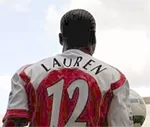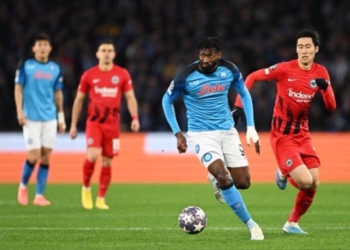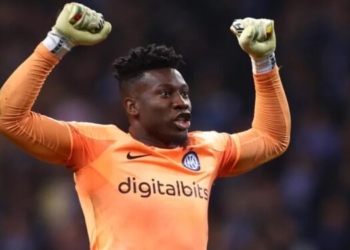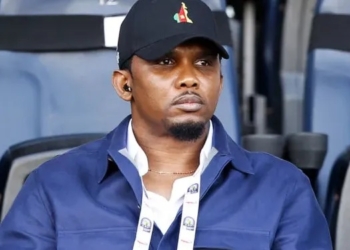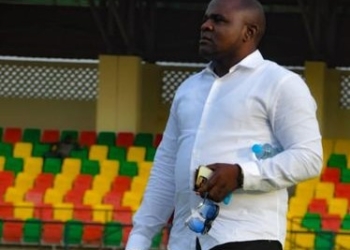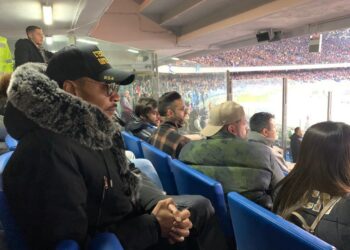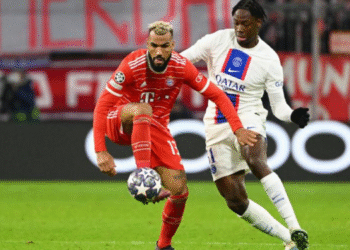Every footballer seems to have a story. Whether it is Kolo Toure learning the game in bare feet back in the Ivory Coast, Thierry Henry honing his skills in a playground in a rough suburb of Paris, or Ashley Cole kicking his way out of trouble in East London alongside Ledley King and his Senrab team-mates. But those everyday stories of footballing salvation pale into insignificance in comparison to Lauren’s escape from a regime change in Equatorial Guinea, via way of a poverty-struck childhood in Cameroon and Spain to the pinnacle of English football.
His two league championship and FA Cup medals, as well as Olympic and African Cup of Nations (two) medals speak for themselves, which is perhaps why Lauren has never chosen to talk about the past before our meeting at Arsenal’s training ground near London Colney earlier this week. But now he has decided to shed some light on his fascinating background.
« It’s a long story, which is why I’ve not spoken about it before, » he starts uncertainly. « My family came from Equatorial Guinea, a Spanish colony, and it was just me that was born in Cameroon.
« My family moved because my dad was a politician and there was a regime change so my father had to escape. We went through Cameroon, where I was born, and only after that we went to Spain.
« It’s a long story. My dad [Valentin Etam-Bisan] was a politician in the foreign office, but they changed the regime in 1977 so he had to go.
« He was fleeing for his life when he went to Cameroon. »
Asked if his parents’ lives were at threat, Lauren nods. It is no exaggeration to say that Lauren owes his life – forget his football career or even his opportunity to play for Cameroon – to that decision to run.
When Equatorial Guinea severed their diplomatic ties with Spain, Spanish plantation owners shut down their operations, foreign investment declined, and the nation suffered a severe drop in population, with 25,000 to 80,000 of the country’s inhabitants estimated to have been killed by the government.
However, what should have been a fairytale ending was the beginning of the hard luck story: his dad moved to Spain when he was only three.
Despite his father’s respected position – he used his connections as director of telecommunications to escape to Spain where he worked in the civil service – life in Andalusia was not all oranges and fiestas.
As one of 15 family members sharing two poky flats in a suburb called Montequinto, he was frequently in trouble.
His mum and dad had already split up, but that was not the only problem. The area was poor and Lauren had little in common with his father, a strict authoritarian. The two had a succession of run-ins, and although the player is vague about what happened, it is clear the problems were more than just teenage kicks.
Following his father’s footsteps into politics was not exactly an option.
« I always had a different perception on life [to my father], » said Lauren, with a slightly embarrassed grin. « I was completely different. In every family there are rules and I didn’t want to obey the rules. I went my own way and I had a lot of problems.
« I used to go out after training, stay away, not come home… [He laughs] I can’t say everything that I did. I was just like most of the people who grow up in poor areas and difficult areas. »
As Lauren interrupts the interview to unzip his leather shower bag and answer a polyphonic ring tone on his mobile phone – « Jose? » he begins – it provides a welcome image of how life has changed.

In contrast to those tough days roaming the streets, this week when Patrick Vieira, Dennis Bergkamp and the rest of the team came round for dinner, he called the caterers.
Lauren knows he is lucky and that is why he has been talking with Patti Boulaye – the singer and former television star who is a well-known fund-raiser for charities in Africa – for more than a year about helping raise money for a hospital in Cameroon. He hopes to be able to put something in place by the end of 2005.
But even if you can take the man out of the street, you can’t take the street out of the man.
While the quiet, almost shy man who is carefully explaining his life story has more in common with the politician than the streets, the man on the pitch has had his fair share of tabloid headlines this year after off-field rows with Thierry Henry and Patrick Vieira.
There were pictures of him being separated from his club captain on the team bus after the Champions League match in Rosenborg.
Lauren doesn’t duck the issue: the arguments happened. But he is at pains to explain why.
« Everything was an overreaction by the media, » he said. « These things are normal, you talk about what happened. Normally you talk about these things when you are at home having dinner, you say the truth, you say what you are thinking [but you are more relaxed].
« On the pitch you say the things but in different circumstances.
« I am quite a strong character. Sometimes you need to say what you think and sometimes they say what they think and you have to accept it. »
Most people who have played football will sympathise: most fans demand that commitment.
Indeed, reports of Lauren being a loner don’t stand up either. The fact he had just had the team round to dinner suggests there are no grudges.
One of the players he says he is closest to is Vieira, the man with whom he reportedly fought on the bus.
In any case, you wouldn’t want to argue with Lauren. Softly spoken he may be, but he learned to box growing up in a rough neighbourhood with Marcos Munoz, who later became a Spanish champion.
Lauren still has his boxing gloves at home and likes to keep himself in trim with some sparring time.
On the pitch, too, he is something of a scrapper. There is no better example of that than his ferocious late tackle on Ruud van Nistelrooy at Old Trafford, before emerging with the ball at his feet to launch a desperate late attack.
But then he has needed to battle to make it at Arsenal, transforming himself from a midfield playmaker to defensive lynchpin after joining from Real Mallorca, having started his career at Seville.
It has been so successful that he is one of the few players Arsene Wenger never rests, and last season the only games he missed were through injury or suspension. Two weeks ago, the statistics service Actim voted him as the best defender in the Premiership.

« As long as you have success, that is the most important thing. After 16 years as a professional what matters is what you’ve achieved. It doesn’t matter what position you play in, only what you have won. »
That was the lesson Lauren learned from his childhood.
« Without that I wouldn’t be a footballer, » he said. « Without my family and also their situation, I would have taken another way, a wrong way. I have to look back, always, every day, to where I have come from because maybe I have a different life and I have changed now, but your friends are still the same and I always remember that. »
It is something he would like to tell his father, who tried to discourage him from football when he was growing up. Their relationship is fractured.
« It is not the best, but we are still in contact, » said Lauren hopefully. « We’ve got too many differences between us since I’ve grown up. He was very strict with us all, so we had many disagreements. »
As someone whose family fled a political coup, Lauren knows only too well that football and politics never mix. But that won’t stop him trying.
Doug Gratton, doug.gratton@islingtonexpress.co.uk
Five things you didn’t know about Lauren
-Lauren’s parents are both from Equatorial Guinea where his father was a politician. Lauren was born in Cameroon after his parents sort refuge there while fleeing a regime change. When he was three they moved to Spain, although his parents split up.
-The defender learned to look after himself as one of « more than 20 » brothers. When he was growing up in Seville, he was one of 15 people sharing two small flats with a total of six rooms between them.
-The tough-tackler learned to box alongside Marcos Munoz, who later became Spanish champion. He still keeps his gloves at home and trains when he can.
-He likes to unwind by reading books, and his favourite author is Paulo Coelho. He doesn’t like playing playstation.
-He has just become a father for the first time. His baby is just three months old.


